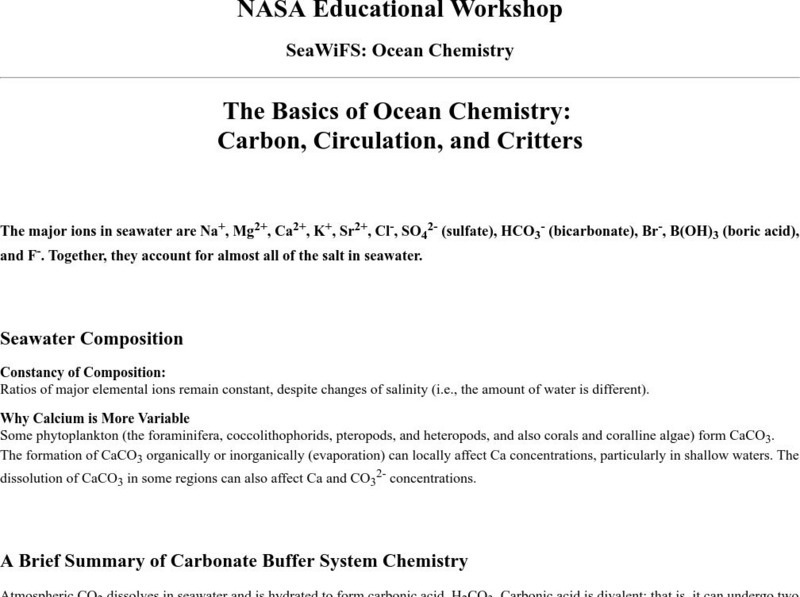Curated OER
Eutrophication
Students observe the effects of eutrophication and determine why it is harmful to aquatic ecosystems. They create mason jar ecosystems to observe the growth of algae in pond water. In addition, they observe the effect of introducing...
NOAA
I Can't Breathe!
The Gulf of Mexico dead zone, an area of low oxygen that kills marine life, costs the United States $82 million every year. Young scientists research anoxic ocean environments then come up with a hypothesis for the cause of the Gulf of...
Curated OER
Week 3: Pollution Source and Effects
Lab groups set up an experiment to observe what happens over time in collected pond water when fertilizer, representing pollution, is added. This website does not include student lab sheets, but background information, materials, and...
Curated OER
Eutrophication Experiments
Observe two different water samples and write down observations. Write a paragraph which predicts the relative amounts of nutrients, nitrates, and phosphates in the water samples. Compare water samples under a microscope.
Virginia Department of Education
Changes in Ecosystems
How does water pollution affect the environment? Provide your class with the resources to answer this question as they learn about eutrophication and ecosystem changes. Over two weeks, they simulate the effects of pollution on the...
Curated OER
Pea Soup Ponds
Students perform an experiment where they learn how water can be polluted by algal bloom. They grow algae with different concentrations of fertilizers or nutrients and analyze their results.
Salt River Project
How Do We Clean Polluted Water?
How do we clean up oil spills and other pollutants in the water? Explore water treatment strategies with a set of environmental science experiments. Groups remove oil from water, work with wastewater treatment, and perform a water...
Curated OER
Diurnal Cycling Experiments
High schoolers carry out an experiment to monitor diurnal fluctuations in dissolved oxygen, carbon dioxide, pH, and water temperature. They determine the CO2 and pH of the samples (and optionally, dissolved oxygen). Students complete...
Curated OER
Water Filtration
As an example of nature's water filtering system, young ecologists conduct an experiment in the lab. They construct a funnel out of a plastic bottle, fill it with specified layers of materials that simulate layers of soil, then run muddy...
Curated OER
Ions in the Environment
Students explain the importance of the five main biogeochemical cycles. In this chemistry lesson plan, students discuss how ions are transported in the environment. They design an experiment to collect data on eutrophication.
Curated OER
The Marvels of Mud
Young scientists roll up their sleeves and get a little dirty in this three-day earth science investigation. Following the scientific method, children monitor the growth of algae in pond water samples in order to determine...
Curated OER
Determination of Phosphates
Students engage in a laboratory lesson in order to increase understanding of the impact of phosphates at the chemical and ecological levels. The lab exercise is completed with the goal of getting them to predict the outcomes and future...
Curated OER
Water Density Boundaries
Young scholars create observable layers in water that represent a separation based upon density differences. They model density boundaries using differences in temperature and salinity. They, in groups, perform a meaningful experiment...
Curated OER
Ecology and the Conservation of Natural Resources
Students examine the components of ecosystems. They compare and contrast an ecosystem to an aquatic ecosystem. They examine a local ecosystem and discuss its components.
NASA
Nasa: The Basics of Ocean Chemistry: Carbon, Circulation, and Critters
An explanation of ocean chemistry, supported by illustrations, for example, of the global carbon cycle in the 1980s and the annual carbon dioxide flux. The concentration of nutrients in the ocean is discussed for its impact on marine...
Science Education Resource Center at Carleton College
Serc: Lab 7: Nitrates and Phosphates and Algae, Oh My!
A lab experiment, in a series of experiments, that investigates fisheries. In this lab, students test the effects of fertilizers and other pollutants on a model ecosystem. Students also examine 2 years of ocean color (chlorophyll...















